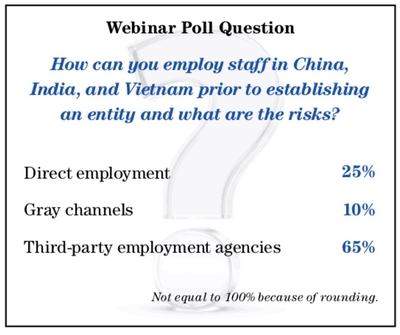Foreign companies doing business in Asia face a daunting task but can succeed by paying close  attention to a vastly different set of rules, Richard Cant of Dezan Shira & Associates said in the GPMI webinar “Asia’s Changing Payroll Landscape: China, India and Vietnam.”
attention to a vastly different set of rules, Richard Cant of Dezan Shira & Associates said in the GPMI webinar “Asia’s Changing Payroll Landscape: China, India and Vietnam.”
Cant serves as North America Director for Dezan Shira and recently located to Boston after 10 years in Shanghai for the company, which advises multinationals on corporate establishment, business, tax and compliance, accounting, payroll, due diligence, and financial review services regarding Asia.
“The whole of Asia is booming when it comes to investment from foreign businesses,” he told his audience. “It’s a very different landscape, as you can well imagine. It can be a daunting prospect, a much tougher place for doing business than in established economies like in North America and Europe.”
China remains the powerhouse, he said, but its rising costs and difficult political climate are causing foreign investors to move some processes to other locations in what is known as the “China plus one” strategy. India and Vietnam are primed to take advantage of the situation if they make the right moves.
China Has Strict Labor Laws
Of all the challenges China poses, human resources is usually at the top of the list for foreign businesses, Cant said.
“China is a worker’s paradise,” he said. “It’s a very different situation to what is found particularly in the USA and also in Europe. Chinese labor law is very much in favor of employees, and it’s very strict. The Chinese authorities take their labor laws very seriously, and it has to be adhered to. They’re primarily designed to protect the employee, so employers must diligently follow them.”
China also requires a higher standard for foreign employers than for local firms, he said.
“If you get involved in a wrongful termination, you can get into some serious problems before a labor tribunal,” Cant said. “If you do wrongfully terminate, the employee can ask for reinstatement, which can be very destabilizing and very embarrassing.”
India Is More Employer-Friendly
India is more employer-friendly, a trait stemming from its days under the rule of the British Empire, Cant explained.
“The difference between India and China is that India is more interested in the contract, which is a common-law contract, and China is more interested in the rights of the employees,” he said.
Foreign businesses entering India need to be aware of the difference between short-term business visas and long-term employment visas, which involve a much more stringent application process. Businesses also must focus on India’s complex, residency-based income tax rules.
“India is poised, potentially, to take over China’s role as the manufacturing and industrial base of the world if it can get its regulatory issues together,” Cant said.
Vietnam Has Better Labor Costs
Business is booming in Vietnam, with labor costs at approximately half those of China, but the country has HR challenges.
“There’s a skill shortage—lack of English, lack of technical skills—but a very large, young labor pool is poised to take a lot of the excess moving from China, Cant said.
Onerous overtime and maternity leave provisions and a complicated income tax system should be on the radar of foreign businesses.
“The rules are developing, and workers there are developing an awareness of their rights,” he said.
Susan Garcia, GPMI’s Account Manager, hosted the webinar, which is available on demand.